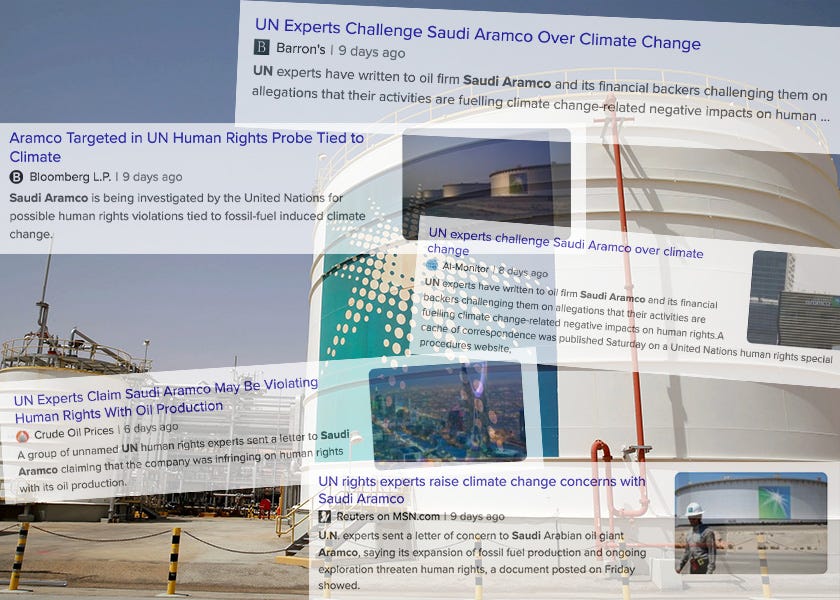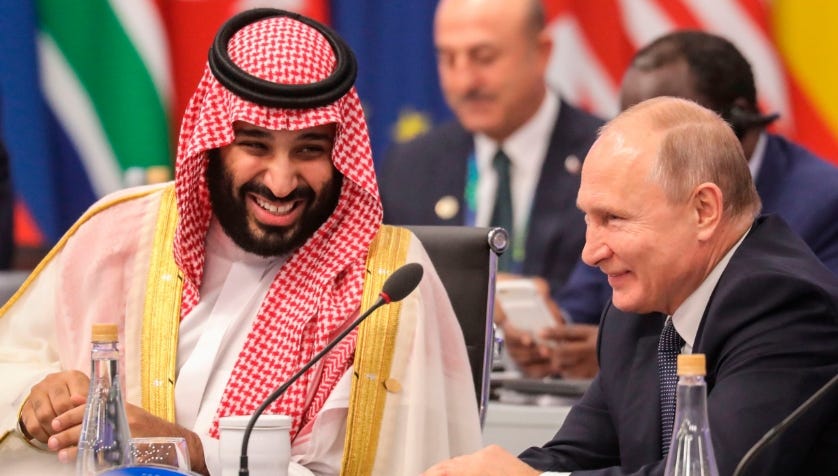Money Talks
“Is there anyone I wouldn't take as a client? Well, I'd never represent a banker.” – Gerry Spence
In late 2021, the European environmental advocacy group ClientEarth discreetly filed a 94-page complaint with the United Nations (UN) Human Rights Council against Saudi Aramco, the world’s largest oil-producing company. ClientEarth’s missive asserts that (1) the continued production of fossil fuels is a de facto affront to human rights, (2) Saudi Aramco is a large producer of fossil fuels and intends to be so for decades to come, and (3) the combination of these two assertions makes Aramco a pariah under international law.
ClientEarth’s complaint was treated with the utmost seriousness, commanding a parade of UN officials over a nearly 2-year period of internal review, resulting in a response from the UN Working Group on the Issue of Human Rights and Transnational Corporations and Other Business Enterprises, the Special Rapporteur on the Promotion and Protection of Human Rights in the Context of Climate Change, the Special Rapporteur on the Issue of Human Rights Obligations Relating to the Enjoyment of a Safe, Clean, Healthy and Sustainable Environment, the Special Rapporteur on the Implications for Human Rights of the Environmentally Sound Management and Disposal of Hazardous Substances and Wastes, and the Special Rapporteur on the Human Rights to Safe Drinking Water and Sanitation.
That’s a lot of rapporteurs.
It wasn’t until June 26th of this year that these UN advisors delivered a sternly worded letter to Amin Nasser, CEO of Saudi Aramco and close advisor to Saudi Crown Prince Mohammed Bin Salman (MBS), informing him of this rather serious complaint and issuing demands for all manner of company information. A copy of the letter was also distributed to Saudi Aramco’s bankers, including JPMorgan Chase, Citigroup, HSBC Holdings, Sumitomo Mitsui Banking Corporation, Crédit Agricole, Morgan Stanley, BNP Paribas, Goldman Sachs Group, Mizuho Financial Group, Société Générale, and EIG Global Energy Partners. Two months after delivering the correspondence, the UN released it to the public, triggering a predictable avalanche of headlines:
In the weeks between when the UN letter was sent and when it was made known, a fascinating development laid bare the vast juxtaposition between what this cadre of rapporteurs was busying itself with, and the raw power politics of energy and high finance. To wit (emphasis added throughout):
“The world's top asset manager BlackRock has named Amin Nasser, the chief of the world's largest oil company Saudi Aramco, as an independent director. Nasser joined Saudi Arabia's state oil giant as a petroleum engineer in 1982, and decades later in 2019 led Aramco's initial public offering.
His expertise in the Middle East will fill the gap left by Bader Alsaad, chairman of the board of the Arab Fund for Economic & Social Development, who is not standing for reelection on BlackRock's board in 2024, the asset manager said on Monday.”
This jarring sequence of events would be amusing if it weren’t so absurd—a pointed example of our fragmented scientific, political, and financial discourse. To identify where the real power lies, ask yourself a simple question: which can’t the world live without, oil or the UN? Imagine if Saudi Aramco stopped producing oil today, or even signaled to the market that it would drastically cut investment in exploration and production.
Perhaps sensing political weakness with the developed world, MBS has ensnared it in a game of “be careful what you wish for.” In the past several months, Saudi Arabia began systematically flexing its market power, something made all the more effective by the West’s bungled collective energy policy. In so doing, MBS is signaling that his new “Saudi First” policy will have teeth to alter the energy landscape for decades to come. As the West unsuccessfully tries to wean itself off fossil fuels and kneecap its production of the world’s most important commodity in the process, will the oil-rich countries have the discipline to extract maximum value? What are the potential economic and geopolitical impacts of elevated energy prices? Will Wall Street chase the money, as it seemingly always does? Let’s explore the recent news flow.



